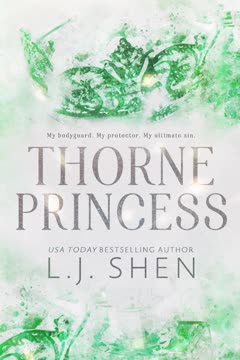Plot Summary
Nightmares Become Reality
Gia Bennett's life is upended when her boss, Tatum Blackthorn, the man who haunts her nightmares, discovers her vulnerability—her ailing mother. Tate, cold and calculating, offers Gia a deal she cannot refuse: her mother's life in exchange for Gia's own. The lines between nightmare and reality blur as Gia is forced to confront the darkness she's always feared, now embodied in the man who controls her fate. The emotional tension is palpable, as Gia's desperation collides with Tate's obsession, setting the stage for a twisted relationship where power, fear, and desire become inseparable.
The Devil's Bargain
Gia's world narrows to a single, impossible choice: save her mother or save herself. Tate proposes marriage—not for love, but as a transaction. Gia's compliance is the price for her mother's access to an experimental treatment. The arrangement is cold, clinical, and laced with Tate's sadistic pleasure in her discomfort. Yet, beneath the surface, both are drawn to the fire of their mutual antagonism. Gia's resolve is tested as she realizes that the devil's bargain is not just about survival, but about surrendering to a man who wants to own her completely.
A Marriage of Enemies
Gia and Tate's marriage is a battlefield. Their wedding is a spectacle of indifference and humiliation, with Gia forced to play the role of the dutiful wife while Tate continues his campaign of psychological warfare. Theirs is a union forged in resentment, but also in a strange, undeniable chemistry. Gia's independence clashes with Tate's need for control, and every interaction is a test of wills. As they navigate the treacherous waters of their new life together, the boundaries between hate and desire begin to erode, leaving both vulnerable in ways they never expected.
Haunted by the Past
Both Gia and Tate are haunted by their histories—Gia by the loss of her family and the burden of caring for her mother, Tate by a childhood marked by abuse and the violent death of his adoptive father. Their traumas shape their every move, fueling their mistrust and their need to hurt before being hurt. Tate's rituals and compulsions reveal a mind at war with itself, while Gia's grief threatens to consume her. In the shadows of their shared home, secrets fester, and the past refuses to stay buried, threatening to destroy any hope of peace.
The Price of Protection
As Tate's quest for vengeance against his father's killers entangles him with the Mafia, Gia becomes collateral damage. Threats from rival crime families force Tate to tighten his grip, surrounding Gia with bodyguards and stripping away her last vestiges of freedom. Gia's resentment grows, but so does her understanding of the darkness that drives Tate. When violence erupts and Gia is nearly kidnapped, the stakes become terrifyingly real. Their survival depends on a fragile trust, and the realization that, in this world, love and protection come at a steep price.
Lines Crossed, Hearts Exposed
The tension between Gia and Tate explodes into passion, shattering the barriers they've built. Their physical connection is raw, desperate, and laced with the pain of their pasts. For the first time, they allow themselves to be vulnerable, exposing wounds that have never healed. Tate's obsessive need for control is matched by Gia's fierce independence, creating a volatile mix of tenderness and cruelty. In the darkness, they find a twisted kind of solace, but the lines between love and hate, pleasure and pain, are more blurred than ever.
Blood and Vengeance
Tate's vendetta against his father's murderers spirals into a full-blown Mafia war, dragging Gia deeper into a world of violence and retribution. Each act of vengeance brings new enemies and greater danger, forcing Gia to confront the reality of the man she married. As bodies fall and alliances shift, Gia must decide how far she's willing to go to protect herself—and whether Tate's darkness is something she can live with. The cost of revenge is steep, and both are forced to reckon with the blood on their hands.
Secrets and Confessions
The weight of secrets becomes unbearable. Gia confesses her own role in the tragedy that shaped Tate's life, revealing that she, too, is complicit in the cycle of violence. Tate, in turn, exposes the depth of his trauma and the compulsions that rule him. Their confessions are both a reckoning and a release, breaking the last barriers between them. But trust, once broken, is hard to rebuild. Both must confront the reality of who they are—and whether forgiveness is possible in a world built on betrayal.
The Breaking Point
Gia's mother's death is the final blow, leaving her adrift and untethered. Grief consumes her, and Tate's inability to offer comfort threatens to destroy what little remains of their fragile bond. Both are forced to confront the emptiness at the heart of their lives, and the realization that survival is not the same as living. In the aftermath of loss, they must choose whether to cling to the ruins of their marriage or risk everything for a chance at something real.
Love in the Darkness
In the depths of despair, Gia and Tate find each other—not as enemies, but as partners in pain. Therapy, honesty, and the slow work of rebuilding trust become their salvation. Tate confronts his mental health, seeking help for the first time, while Gia learns to let go of her need to control everything. Together, they discover that love is not the absence of darkness, but the willingness to face it together. Their relationship, once built on power and fear, becomes a sanctuary where both can finally be seen and accepted.
The Cost of Survival
The journey to healing is neither easy nor linear. Gia and Tate must sacrifice old identities and patterns, learning to prioritize each other over pride and vengeance. The world around them remains dangerous, but they carve out a space of safety and hope. Gia's decision to move back to England marks a turning point, offering both a chance to start anew. The cost of survival is high, but the reward is a love forged in fire—imperfect, but enduring.
A War for Peace
The final confrontation with the Mafia brings closure, but not without loss. Tate must choose between revenge and the future he wants with Gia, ultimately sacrificing his need for retribution to protect the woman he loves. Peace comes not through victory, but through surrender—of old grudges, of the need to control, of the belief that love is weakness. In choosing each other, Gia and Tate find the strength to build a life beyond violence.
Loss and Letting Go
The aftermath of Gia's mother's death is a time of mourning, but also of renewal. Surrounded by friends and the family they've chosen, Gia and Tate learn to honor the past without being bound by it. The pain of loss becomes a foundation for growth, and the scars they carry are transformed into symbols of survival. In letting go, they make room for new beginnings and the possibility of happiness.
Redemption and Ruin
Redemption is not found in grand gestures, but in the daily work of loving and being loved. Tate's journey through therapy and self-discovery allows him to accept his flaws and embrace vulnerability. Gia, too, learns to forgive herself and trust in the future. Together, they create a life that is messy, complicated, and real—a testament to the power of forgiveness and the resilience of the human heart.
A New Beginning
In the quiet of their new life in England, Gia and Tate find peace. The ghosts of their pasts no longer haunt them, and the future is bright with promise. Parenthood, friendship, and the simple joys of daily life become their new reality. Their love, once forged in darkness, now shines with the warmth of hope. The story ends not with a grand triumph, but with the quiet certainty that, together, they can face anything—and that, sometimes, the greatest victory is simply surviving, and loving, against all odds.
Characters
Gia Bennett
Gia is a woman forged by loss and responsibility, having lost her father and brother in a tragic accident and caring for her mother through the ravages of dementia. Her strength lies in her ability to endure, to adapt, and to fight for those she loves—even when it means sacrificing her own happiness. Gia's relationship with Tate is a crucible, forcing her to confront her own darkness and capacity for forgiveness. She is fiercely independent, yet deeply vulnerable, and her journey is one of learning to accept love, to let go of guilt, and to choose herself without abandoning those who depend on her. Her evolution from victim to partner is the emotional core of the novel.
Tatum "Tate" Blackthorn / Gabriel Doe
Tate is a man shaped by trauma: a childhood of abuse, the murder of his adoptive father, and a lifetime of isolation. His brilliance is matched only by his ruthlessness, and his obsessive-compulsive disorder manifests in rituals and a need for control. Tate's fixation on Gia is both a punishment and a plea for connection—he wants to own her, but also to be saved by her. His journey is one of painful self-awareness, as he confronts his mental illness, his capacity for violence, and his desperate need for love. Through therapy and Gia's unwavering presence, Tate learns that vulnerability is not weakness, and that redemption is possible even for those who believe themselves beyond saving.
Telma Bennett
Telma's decline into dementia is the catalyst for much of Gia's sacrifice and suffering. Her presence haunts the narrative, representing both the pain of losing a loved one and the enduring power of memory and love. Telma's eventual passing is a moment of profound grief, but also of release, allowing Gia to finally begin healing. Her spirit, wisdom, and warmth linger, shaping Gia's choices and offering a reminder that love endures beyond death.
Enzo Ferrante
Enzo is a member of the Ferrante crime family, tasked with protecting Gia during the height of the Mafia war. Beneath his bravado and dark humor lies a man who understands the cost of violence and the burden of loyalty. Enzo's interactions with Gia reveal his empathy and his own struggles with the world he inhabits. He serves as both protector and confidant, offering moments of levity and insight amid the chaos.
Achilles Ferrante
Achilles is the embodiment of the Mafia's brutality—a man who relishes violence and power. His relationship with Tate is one of mutual respect and rivalry, and his actions drive much of the external conflict. Achilles is both a threat and an ally, his unpredictability keeping everyone on edge. He represents the dangers of a world where loyalty is conditional and violence is currency.
Tiernan Callaghan
Tiernan is the head of the rival Irish Mafia, a man as cunning as he is dangerous. His vendetta against Tate and willingness to use Gia as leverage escalate the stakes, forcing both protagonists to confront the limits of their power and the depth of their commitment to each other. Tiernan's presence is a constant reminder that the past cannot be outrun, and that peace often comes at a price.
Row Casablancas
Row is one of Tate's few genuine friends, offering a counterpoint to Tate's darkness with his own brand of loyalty and humor. His relationship with Gia is one of mutual respect, and his willingness to challenge Tate provides moments of clarity and growth. Row's presence grounds the narrative, reminding both Gia and Tate of the importance of chosen family.
Calla Casablancas
Calla is Gia's closest friend, offering unwavering support through every trial. Her warmth, humor, and honesty provide a safe haven for Gia, and her own experiences with trauma and healing mirror Gia's journey. Calla's friendship is a lifeline, reminding Gia that she is not alone and that love can be found in many forms.
Dylan Litvin
Dylan brings levity and strength to the story, her irreverence and loyalty helping Gia navigate the darkest moments. She is unafraid to challenge both Gia and Tate, pushing them toward honesty and self-acceptance. Dylan's presence is a testament to the power of friendship and the importance of laughter in the face of pain.
Dr. Arjun Patel
Dr. Patel is the voice of reason and hope, guiding Tate through the labyrinth of his mental illness. His patience, insight, and refusal to give up on Tate are instrumental in the latter's journey toward self-acceptance and recovery. Dr. Patel represents the possibility of change, the importance of seeking help, and the belief that even the most damaged souls can find peace.
Plot Devices
Enemies-to-Lovers Marriage of Convenience
The central device is the marriage of convenience between Gia and Tate, born out of desperation and necessity rather than love. This arrangement forces two damaged, distrustful people into close quarters, stripping away their defenses and exposing their vulnerabilities. The enemies-to-lovers arc is heightened by the constant push and pull of power, desire, and resentment, creating a dynamic where love is both a weapon and a salvation. The marriage is not just a plot device, but a crucible in which both characters are remade.
Dual Narration and Psychological Depth
The story alternates between Gia's and Tate's points of view, offering insight into their inner worlds and the traumas that shape them. This dual narration allows for a nuanced exploration of mental illness, grief, and the complexities of love. The psychological depth is further enhanced by the use of rituals, compulsions, and therapy, grounding the narrative in the realities of healing and self-discovery.
Mafia War and External Threats
The ongoing Mafia war provides external stakes that mirror the internal battles of the protagonists. The threats from rival families, the constant danger, and the need for protection force Gia and Tate to confront their own limits and the consequences of their choices. The violence is not gratuitous, but serves to heighten the emotional stakes and underscore the cost of survival in a world where trust is rare and betrayal is deadly.
Secrets, Confessions, and Redemption
The gradual revelation of secrets—Gia's role in Tate's past, Tate's mental illness, the true nature of their traumas—serves as both a source of conflict and a path to redemption. Confession becomes an act of vulnerability, and forgiveness is hard-won. The narrative structure uses these revelations to build tension, deepen character development, and ultimately offer hope for healing.
Symbolism and Motifs
The recurring motif of the seashell bracelet, the use of Alice's Adventures in Wonderland, and the rituals of numbers and routines serve as symbols of hope, memory, and the struggle for control. These objects and habits ground the characters, offering comfort in chaos and serving as touchstones for their journeys.
Analysis
"Handsome Devil" is a dark, emotionally charged exploration of trauma, love, and redemption set against the backdrop of organized crime. At its core, the novel interrogates the ways in which pain and loss shape identity, and how the quest for control—over oneself, over others, over fate—can both protect and destroy. Through the lens of an enemies-to-lovers marriage, L.J. Shen examines the limits of forgiveness, the necessity of vulnerability, and the possibility of healing even for those who believe themselves irreparably broken. The story's modern relevance lies in its unflinching portrayal of mental illness, the complexities of caregiving, and the power dynamics inherent in relationships. It challenges the notion that love is a panacea, instead suggesting that true connection requires honesty, sacrifice, and the willingness to confront one's own darkness. Ultimately, "Handsome Devil" is a testament to the resilience of the human spirit, the transformative power of chosen family, and the hope that, even in the bleakest circumstances, love can be both a refuge and a revolution.
Last updated:
FAQ
0. Synopsis & Basic Details
What is Handsome Devil about?
- A Desperate Bargain: Gia Bennett, a fiercely independent woman, is forced into a marriage of convenience with her enigmatic and ruthless boss, Tatum Blackthorn, to secure life-saving experimental treatment for her ailing mother. This arrangement plunges her into a world of psychological warfare and unexpected danger.
- Enemies to Unlikely Allies: The story follows Gia and Tate as their initial animosity, fueled by Tate's dark past and Gia's hidden secrets, slowly transforms into a complex bond. Their forced proximity and shared threats from a burgeoning Mafia war expose deep-seated traumas and a surprising, undeniable attraction.
- Healing Through Chaos: Amidst Tate's quest for vengeance against his father's killers and Gia's struggle with grief and moral compromise, they navigate a treacherous path towards self-discovery and healing. The narrative explores themes of mental illness, the nature of love, and the possibility of redemption in the darkest of circumstances.
Why should I read Handsome Devil?
- Intense Psychological Depth: Dive into the minds of two deeply flawed protagonists, Tate and Gia, whose complex motivations and hidden traumas are meticulously unraveled. The novel offers a raw, unflinching look at mental illness, grief, and the psychological toll of a life steeped in violence and control.
- Unpredictable Enemies-to-Lovers: Experience a truly unconventional romance where the line between hate and desire is constantly blurred. The forced marriage dynamic, combined with a high-stakes Mafia backdrop, creates a volatile chemistry that keeps readers on the edge, questioning whether love can truly blossom from such dark origins.
- Rich Thematic Exploration: Beyond the thrilling plot, the book delves into profound themes of family, sacrifice, justice, and the search for identity. It challenges conventional notions of good and evil, exploring how individuals cope with immense pressure and find connection in a world that often feels devoid of it.
What is the background of Handsome Devil?
- Contemporary London & New York Setting: The story primarily unfolds in the bustling, high-stakes corporate world of New York City, with significant ties to London, reflecting Gia's British roots and Tate's international business empire. This dual setting highlights the cultural clash and the vast distances Gia travels for her family.
- Mafia Underworld Intrigue: The narrative is deeply embedded in the shadowy world of organized crime, specifically involving the New York Camorra (Ferrante family) and the Irish Mafia (Callaghan clan). This backdrop provides constant external threats, escalating the stakes and forcing the protagonists into morally ambiguous situations.
- Exploration of Mental Health: A crucial background element, explicitly stated by the author, is the exploration of obsessive-compulsive disorder (OCD) and antisocial personality disorder (ASPD) through Tate's character. The author's personal connection to OCD lends authenticity to Tate's rituals and struggles, grounding the dark romance in a sensitive portrayal of mental illness.
What are the most memorable quotes in Handsome Devil?
- "I made a deal with the devil to save my mother… But is it really hell if I love the way it burns?": This opening line from Gia's perspective perfectly encapsulates the central conflict and her internal struggle, hinting at the dark allure of her relationship with Tate and the moral compromises she makes. It defines the core themes of sacrifice and forbidden attraction in Handsome Devil.
- "My real name is Gabriel. Gabriel Doe. And he—I—we love you. We've loved you from the first moment we saw you.": This pivotal confession from Tate (Gabriel) marks a profound turning point, revealing his true identity and the depth of his long-suppressed emotions. It signifies his complete vulnerability and acceptance of love, a moment readers often highlight as the emotional climax of Handsome Devil explained.
- "Because I used to put my happiness before yours and thought I'd never let you go. I am now willing to let you go if it's what makes you happy.": This quote from Tate demonstrates his ultimate transformation and the true nature of his love for Gia. It shows his willingness to sacrifice his deepest desires for her well-being, a stark contrast to his earlier possessiveness, and is key to understanding Tate Blackthorn's character development.
What writing style, narrative choices, and literary techniques does L.J. Shen use?
- Dual POV & Internal Monologue: Shen employs a first-person dual point-of-view, alternating between Gia and Tate, which provides intimate access to their complex thoughts, hidden motivations, and emotional turmoil. This narrative choice is crucial for understanding the psychological depth and internal conflicts of Handsome Devil characters.
- Sharp, Witty Dialogue & Subtext: The dialogue is characterized by its quick, often sarcastic exchanges, laden with subtext that reveals the characters' true feelings and power dynamics. Even in moments of intense conflict, their banter serves as a coping mechanism and a subtle form of foreplay, enhancing the enemies-to-lovers tension.
- Symbolism & Foreshadowing: Shen skillfully weaves in recurring symbols like the seashell bracelet, Alice's Adventures in Wonderland, and Tate's numerical rituals, which deepen thematic understanding and foreshadow character arcs. The contrast between external composure and internal chaos is a recurring motif, adding layers to the Handsome Devil analysis.
1. Hidden Details & Subtle Connections
What are some minor details that add significant meaning?
- Tate's "Two, Six, Two" Tapping: This seemingly random tic, initially presented as a sign of Tate's impatience or annoyance, is later revealed to be a core ritual of his undiagnosed OCD. The rhythmic tapping, often occurring in moments of stress or when Gia challenges him, subtly foreshadows his mental health struggles and his desperate need for control and order, a key element in Tate Blackthorn's psychological analysis.
- Gia's Seashell Bracelet: The junonia shell bracelet, a gift from her late father, is more than just a keepsake; it symbolizes strength, grace, and self-sufficiency, qualities Gia desperately clings to. Its loss and Tate's later quest to replace it (and ultimately, his gift of a new, diamond-studded one) highlight his understanding of her deepest emotional anchors and his evolving desire to nurture her, adding depth to Handsome Devil symbolism.
- Tate's Alice in Wonderland Obsession: Tate's constant reading of Alice's Adventures in Wonderland is initially presented as an eccentric quirk. However, its description as "the first children's book in the world without a lesson or a moral" reflects his own amoral worldview and his struggle with conventional ethics. The book's themes of chaos, identity, and a "different reality" mirror Tate's internal world and his journey towards accepting his own "unhinged" nature, offering a rich layer to themes in Handsome Devil.
What are some subtle foreshadowing and callbacks?
- Tate's Early Knowledge of Gia's Family: The revelation that Tate first saw Gia during a "snowstorm" (when she was interviewing for a job at Fiscal Heights Holdings, weeks after his father's sentencing) and his immediate decision to hire her, foreshadows his long-standing, calculated obsession. This callback to their initial encounter reveals his meticulous planning and the deep-seated revenge plot that underpins their relationship, crucial for understanding Tate's motivations explained.
- Enzo's "Pacifist" Claim and Knife Sheaths: Enzo's seemingly lighthearted confession about flaying a victim and making "knife sheaths" from their skin, despite claiming to be a "pacifist," subtly foreshadows the brutal realities of the Mafia world and the Ferrante family's capacity for extreme violence. It's a dark callback to the initiation rituals mentioned earlier and highlights the deceptive nature of appearances within this criminal underworld, adding to the Mafia themes in Handsome Devil.
- The "Invisible People" Conversation: Gia's heartfelt explanation of her empathy for "invisible people" (cleaners, stockers, etc.) and her desire to make them feel seen, subtly foreshadows her later initiative to form a workers' union at GS Properties. This callback to her core values reinforces her inherent goodness and her commitment to social justice, contrasting sharply with Tate's initial ruthlessness and setting the stage for her transformative influence on him, a key aspect of Gia Bennett's character analysis.
Who are the most significant supporting characters?
- Dr. Arjun Patel: Tate's psychiatrist, Dr. Patel, is a crucial, albeit often unseen, supporting character. His persistent emails and eventual direct intervention highlight Tate's severe mental health issues (OCD, ASPD, cognitive distortion) and serve as a constant reminder of the internal battle Tate is fighting. Dr. Patel represents the path to healing and the possibility of change, making him vital to Tate Blackthorn's redemption arc.
- The Ferrante Brothers (Luca, Achilles, Enzo): These three brothers are more than just Mafia figures; they represent different facets of the criminal underworld and serve as a complex moral compass for Tate. Luca is the calculating strategist, Achilles the brutal enforcer, and Enzo the seemingly charming but equally dangerous "pacifist." Their interactions with Tate and Gia provide both comic relief and stark reminders of the dangers they face, deeply influencing the Mafia war plot in Handsome Devil.
- Cal and Dylan (Gia's Friends): Calla Casablancas and Dylan Litvin are essential for Gia's emotional support and grounding. They offer unwavering friendship, a safe space for Gia to express her true feelings, and a connection to a "normal" life outside Tate's chaotic orbit. Their presence highlights the theme of chosen family and provides a contrast to the toxic dynamics of Gia's marriage, offering crucial insight into Gia Bennett's emotional journey.
2. Psychological, Emotional, & Relational Analysis
What are some unspoken motivations of the characters?
- Tate's Desire for a "Normal" Family: Beneath Tate's ruthless exterior and desire for revenge, there's an unspoken longing for the stable, loving family he never had. His insistence on having children with Gia, despite claiming to dislike her, and his later adoption of Brayden, hint at a deep-seated need to replicate the positive aspects of his relationship with Daniel, revealing a hidden vulnerability in Tate Blackthorn's motivations.
- Gia's Need for Control Amidst Chaos: While Gia appears to be a victim of circumstance, her defiance and constant pushback against Tate are driven by an unspoken need to reclaim agency in a life where she's lost so much. Her willingness to challenge Tate, even at great personal risk, stems from a deep-seated fear of being completely powerless, a key aspect of Gia Bennett's psychological complexities.
- Daniel Hastings's Protective Instincts: Tate's adoptive father, Daniel, is motivated by an unspoken desire to shield Tate from the trauma he endured. His decision to take the fall for Gorga's death and his later murder of Andrin demonstrate a fierce, unconditional love that Tate struggles to comprehend or reciprocate, highlighting the profound impact of Daniel Hastings's influence on Tate.
What psychological complexities do the characters exhibit?
- Tate's High-Functioning ASPD and OCD: Tate exhibits a complex interplay of Antisocial Personality Disorder (ASPD) and Obsessive-Compulsive Disorder (OCD). His ASPD manifests in a lack of empathy, manipulative tendencies, and a disregard for social norms, while his OCD drives his need for rigid routines, mathematical equations, and control. This combination creates a character who is both terrifyingly effective and deeply tormented, central to Tate Blackthorn's psychological analysis.
- Gia's Trauma-Induced Resilience and Guilt: Gia's past losses (father, brother, mother's dementia) have forged a fierce resilience, but also a profound sense of guilt and a tendency towards self-sacrifice. Her initial attraction to Tate's darkness, despite her moral compass, suggests a subconscious pull towards chaos as a reflection of her own internal turmoil, exploring the emotional impact of trauma on Gia Bennett.
- The Ferrantes' Deceptive Morality: The Ferrante brothers, particularly Luca and Achilles, display a complex morality where extreme violence coexists with a twisted sense of honor and family loyalty. Their ability to justify brutal acts while adhering to certain "codes" reveals the psychological dissonance inherent in their criminal lives, adding layers to the Mafia character motivations.
What are the major emotional turning points?
- Gia's First Kiss with Tate: The kiss in Times Square after Gia's near-kidnapping is a major emotional turning point. It shatters their carefully constructed walls of animosity, revealing a raw, desperate attraction that neither expected. This moment marks the shift from purely transactional to deeply personal, exposing Gia and Tate's evolving relationship dynamics and the undeniable chemistry between them.
- Tate's Confession of His Past Trauma: Tate's detailed recounting of his childhood abuse by Andrin and the deaths of his pets (Ares, Zeus, Apollo) is a pivotal emotional moment. It humanizes him, revealing the deep wounds beneath his cruel exterior and allowing Gia to see him not just as a monster, but as a damaged individual. This confession is crucial for Tate Blackthorn's character development and fosters a fragile empathy in Gia.
- Gia's Confession of Gorga's Murder: Gia's revelation that she, not Daniel, killed Leon Gorga is a shocking emotional turning point. It levels the playing field between her and Tate, exposing her own capacity for violence and revenge. This shared dark secret deepens their bond, forcing Tate to confront his own biases and accept Gia's "ruthless side," fundamentally altering Gia Bennett's motivations explained and their relationship.
How do relationship dynamics evolve?
- From Transactional to Intimate Partnership: The relationship between Gia and Tate evolves from a purely transactional marriage of convenience, driven by blackmail and desperation, into an intimate partnership built on shared trauma, mutual understanding, and eventually, love. Their initial interactions are marked by power struggles and psychological warfare, but as they reveal their deepest secrets, they begin to rely on each other for emotional support and protection, illustrating the enemies-to-lovers trope in Handsome Devil.
- Tate's Shift from Obsession to Protective Love: Tate's dynamic with Gia transforms from a possessive, vengeful obsession into a fiercely protective and unconditional love. Initially, he seeks to "ruin" her life as payback, but his actions gradually demonstrate a deep care, culminating in his willingness to seek therapy and end the Mafia war for her safety. This evolution highlights Tate Blackthorn's character arc and his capacity for genuine affection.
- Gia's Journey from Defiance to Acceptance: Gia's relationship with Tate begins with strong defiance and a refusal to be controlled. As she navigates the dangers of his world and confronts her own past, she learns to accept Tate's complex nature and her own feelings for him. Her acceptance is not passive but an active choice to embrace a love that is messy and unconventional, showcasing Gia Bennett's emotional growth and the strength of their bond.
4. Interpretation & Debate
Which parts of the story remain ambiguous or open-ended?
- The Full Extent of Tate's Disorders: While the author's note and Tate's internal monologues confirm OCD and ASPD, the precise clinical diagnosis and the full spectrum of his "cocktail of disorders" remain somewhat ambiguous. The narrative focuses on his journey towards managing symptoms rather than a definitive medical explanation, leaving readers to interpret the depth of his psychological struggles and the long-term implications for his mental health, a point of discussion in Tate Blackthorn's psychological analysis.
- The Future of the Ferrante-Callaghan Feud: Although Tate brokers a fragile peace with Tiernan Callaghan, the underlying tensions and the Ferrantes' desire for revenge (especially Achilles's vow to avenge Filippo) suggest that the Mafia war might not be entirely over. The ending hints at future conflicts in the "Society of Villains" series, leaving the long-term stability of the criminal underworld, and by extension, Tate and Gia's safety, open to interpretation, a key aspect of Handsome Devil ending explained.
- The Nature of Tate's "Love": Tate explicitly states he is "incapable of loving" Gia, even as his actions demonstrate profound devotion and sacrifice. The narrative leaves it open for readers to debate whether his intense attachment, possessiveness, and willingness to change for Gia constitute a unique form of love, or if he truly remains incapable of conventional emotional connection. This ambiguity fuels discussions about Tate Blackthorn's motivations and the definition of love itself within the story.
What are some debatable, controversial scenes or moments in Handsome Devil?
Review Summary
Handsome Devil by L.J. Shen is a dark, mafia-themed romance that has received mostly positive reviews. Readers praise the intense chemistry between the main characters, Tate and Gia, and the compelling plot filled with twists and suspense. Many consider it Shen's darkest work yet, with complex characters and emotional depth. While some found it too extreme, others appreciated the exploration of mental health issues and the author's signature writing style. The book is noted for its spicy scenes, witty banter, and satisfying conclusion to the Forbidden Love series.
Forbidden Love Series
Download PDF
Download EPUB
.epub digital book format is ideal for reading ebooks on phones, tablets, and e-readers.












